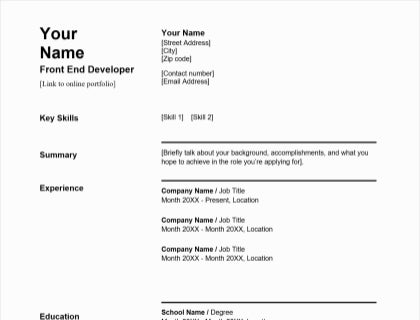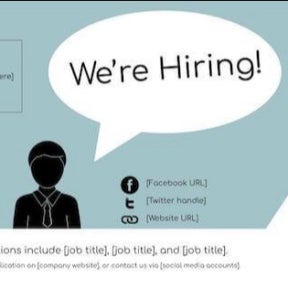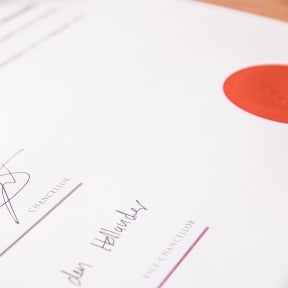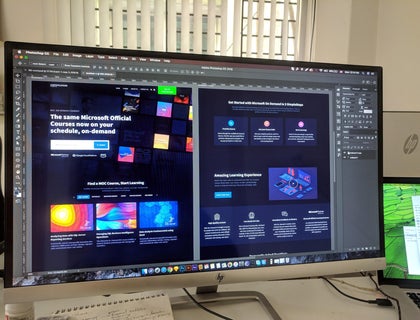
Front-End Developer Resume Free Template Download
Download this front-end developer resume template in Microsoft Word format.
Download NowFront-End Developer Resume Example:
Your Name
Front-End Developer
[Link to online portfolio]
[Physical address]
[Email address]
[Phone number]
[Website]
[LinkedIn]
[Briefly summarize what can be found in your resume. Include career highlights, achievements, years of experience, core skills, and what you believe you can bring to the potential employer's organization.]
Technical Skills:
• [Skill 1]
• [Skill 2]
• [Skill 3]
• [Skill 4]
Experience:
Company name / Job Title
[Start date – End date], [location].
• [Core task 1]
• [Core task 2]
• [Core task 3]
Company name / Job Title
[Start date – End date], [location].
• [Core task 1]
• [Core task 2]
• [Core task 3]
Company name / Job Title
[Start date – End date], [location].
• [Core task 1]
• [Core task 2]
• [Core task 3]
Education:
School name / Degree
[Start date – End date], [location].
School name / Degree
[Start date – End date], [location].
Certification:
• [Certificate 1]
• [Certificate 2]
Notable Achievements:
• [Achievement 1]
• [Achievement 2]
• [Achievement 3]
How to Write a Front-End Developer Resume:

A step-by-step guide to writing the perfect front-end developer resume.
Start with a summary.
Make your summary stand out.

You'll want your summary to create a lasting impression, intriguing employers enough to continue reading your resume. Start by highlighting your most desirable qualities including your skills, years of experience, and greatest accomplishments.
Keep your summary short and to the point.

Try to keep your summary under four sentences and only include the most pertinent information. Add a sentence about how your specific skill set and experience will benefit the employer's organization.
List your technical skills.
Start with your most important skills.

Your front-end developer skills, such as proficiency with the requisite programming languages, an eye for graphic design, SEO best practices, responsive design for mobile-first websites, and more.
Be sure to mention all relevant skills that could set you apart from other candidates.
Match your skill set with the job posting.

You'll want to list all relevant skills and competencies you have acquired over time. Directly match your skills with the job requirements. Do not list skills that will not be needed for the position.
Be honest.

When listing your skills, remain honest about your level of expertise as the hiring process may require practical assessments.
Showcase your experience.
List your work history in reverse chronological order.

The work experience section is an imperative part of your resume as employers will want to read about the computing systems and tasks you've completed at previous positions. You'll want to start this section with your most recent position.
Add the places you have worked.

Include the name of each company, your role, how long you worked there, and where the company is situated. Use bullet points to list the tasks and responsibilities for each position.
Be sure to pay special attention to the type of responsibilities you managed at previous jobs. This will help employers envision you in the role and determine the type of tasks you're knowledgeable in.
Add your education information.
List your qualifications.

In reverse chronological order, add your qualifications, each with an institution name, the dates of attendance, and a location.
Mention qualifications in progress.

If you're studying towards a qualification, indicate it at the start of this section. Omit the initial date and instead include the words "In Progress."
Include any certificates.
List relevant certificates.

While your portfolio of projects already says a lot about you and your abilities, to help improve your chances of an interview, consider adding relevant certifications, even if not required.
Start with your most relevant certificate.

If you obtained more than one certificate, consider which one employers would be most interested in and mention it first.
Common certificates related to front-end developers include:
- W3C Front End Web Developer Certification.
- Front End Web UI Frameworks and Tools: Bootstrap 4.
Add certification details.

Be sure to mention the institution and the date you obtained your certification. Certificates awarded by accredited institutions indicate to employers that you have formal training and that you're passionate about your job.
Describe your achievements.
Highlight any major completed projects.

Your career milestones are a great addition to your resume because they act as solid references, proving to employers that you're more than capable of exceeding their expectations.
These could include developing user experiences that increased user satisfaction, testing code and ensuring cross-browser compatibility, implementing a custom CSS grid system, writing front-end code for Django-based apps, and more.
List key career moments at the end of your resume.

These typically include achievements such as promotions and awards that may be of particular interest to employers.
Use bullet points to briefly describe each key moment and list them in reverse chronological order. Remember that each entry should also identify the institution/employer and don't neglect to provide a date.
What Employers Look for in a Front-End Developer's Resume:
- A well-defined skills set and list of programming languages you have proficiency with. Popular languages for front-end developers are HTML, CSS, JavaScript, and jQuery.
- Experience with graphic design.
- A demonstrated ability to troubleshoot, identify problems, and find solutions to them.
- Evidence of working as part of a team and with different departments, including UI and UX designers, back-end developers, and more.
- A history of working under pressure to meet client deadlines.
- An understanding of client needs and the ability to adapt to different front-end development challenges.
- A relevant degree in computer science. A relevant diploma or certificate in front-end development will help you.
- A link to an online portfolio of work that demonstrates a wide range of front-end development projects.


